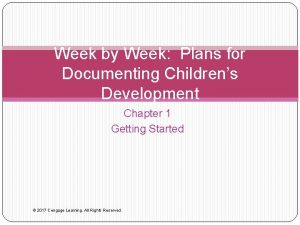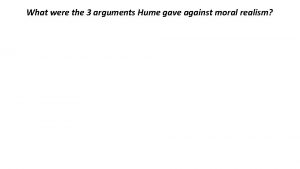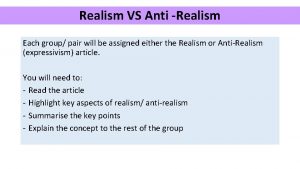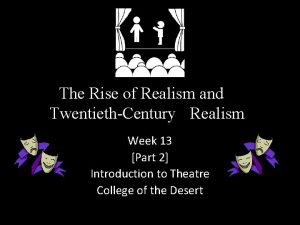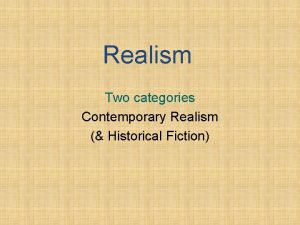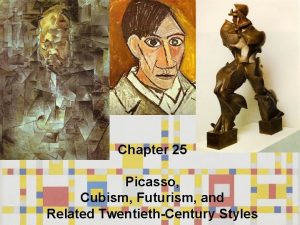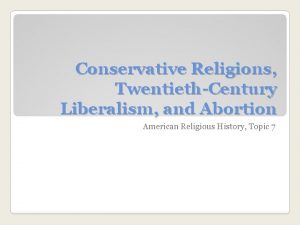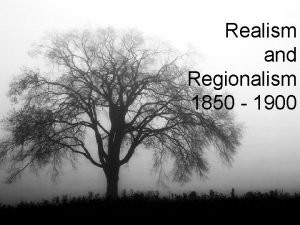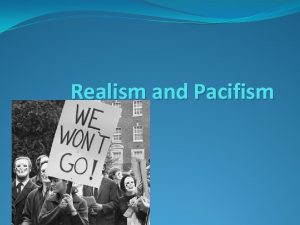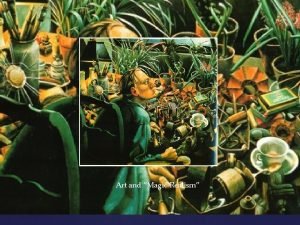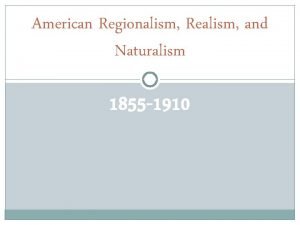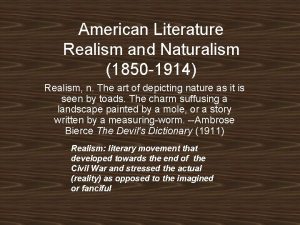The Rise of Realism and TwentiethCentury Realism Week
![The Rise of Realism and Twentieth-Century Realism Week 13 – Year 2 [Part 1] The Rise of Realism and Twentieth-Century Realism Week 13 – Year 2 [Part 1]](https://slidetodoc.com/presentation_image_h2/78fb7d2bc7c23f097d3280c3f854d228/image-1.jpg)














































- Slides: 47
![The Rise of Realism and TwentiethCentury Realism Week 13 Year 2 Part 1 The Rise of Realism and Twentieth-Century Realism Week 13 – Year 2 [Part 1]](https://slidetodoc.com/presentation_image_h2/78fb7d2bc7c23f097d3280c3f854d228/image-1.jpg)
The Rise of Realism and Twentieth-Century Realism Week 13 – Year 2 [Part 1] Introduction to Theatre College of the Desert

• Critiques are expected to be AT LEAST FIVE (5) full double-spaced typewritten pages long. 1 inch margins, 12 pt. Time New Roman font. • Cite your sources APA style (go to “Son of Citation Machine” for help online with citing sources). • VERY IMPORTANT: DO NOT, I REPEAT NOT, GIVE A SYNOPSIS OF THE PLAY (A DESCRIPTION OF WHAT HAPPENS -- THE STORY, IF YOU WILL), EXCEPT FOR A VERY BRIEF ONE (ONE PARAGRAPH OR SHORTER). ASSUME YOUR READER IS FAMILIAR WITH THE PLAY. ANY ELEMENTS OF A SYNOPSIS SHOULD BE USED ONLY TO HELP SUPPORT / DEVELOP THE IDEAS YOU MENTION AS YOU ANALYZE THE PLAY / PRODUCTION. • YOUR CRITIQUE MUST BE AN ANALYSIS OF THE PLAY / PRODUCTION. • BE SURE TO BACK UP / SUPPORT / CLARIFY YOUR IDEAS WITH SPECIFIC EXAMPLES FROM THE PLAY. • Please make sure that you have one specific question you are trying to analyze and that it is clearly stated in your thesis statement.

Fourth Critique Due – 12/3/19 Fences Do TWO of the following: 1. 2. 3. 1. 2. 3. 4. 5. 6. 7. 1. 2. 3. 4. 5. Describe and analyze the play's characters. Are the characters clearly defined? Are they realistic or symbolic? Which characters are in conflict? How do minor characters relate to major ones? Are they mirror images, contrasts, parallels? Which characters are poorly presented? Are they incomplete, inconsistent, unbelievable? Which characters did you identify most closely with? Why? Describe and analyze the content and plot structure of the play. Is the structure serious or comic? Realistic or fantastic? If serious, is it tragic or more down-to-earth? If comic, is it plain comedy or farcical. Does it mix elements? Serious with comic, realistic with unrealistic? Is the play written in climactic form, episodic form, or some other form? What is the major conflict and its initiating incident? Does the play have an early or a late point-of-attack? How is precursor action made clear? How are complications developed and how does the play resolve? Describe and analyze theme of the play. What is the play about? Is it easy to understand or not? Does the play present the subject clearly? Does the playwright seem to have an opinion, or does the playwright appear neutral? How is theme brought about? Words? Actions? Symbols? Is there more than one theme? Are they consistent with one another?

Who was August Wilson? According to Biography. com: • African-American playwright August Wilson won a Pulitzer Prize and a Tony Award for his play Fences, and earned a second Pulitzer Prize for The Piano Lesson. • August Wilson was born on April 27, 1945, in Pittsburgh, Pennsylvania. • His mother, Daisy Wilson, was of African-American heritage. • His father was a German immigrant named Frederick Kittel. • He wrote his first play, Jitney, in 1979. • Wilson's play Fences premiered on Broadway in 1987, earning the playwright his first Pulitzer Prize as well as a Tony Award. Set in the 1950 s, Fences explored themes of the ever-evolving black experience and race relations in America. • Fences was the sixth of the playwright's 10 -part series called The Pittsburgh Cycle (aka The Century Cycle), which defined each "part" by decade. • August Wilson died of liver cancer on October 2, 2005, in Seattle, Washington. • Video: https: //youtu. be/crsf 6 c. Bksd. U

Summary of the Play • • ACT 1 – Scene 1 It is Friday, Troy and Bono's payday. Their responsibilities as garbage collectors are done for the day. Troy and Bono reach Troy's house for their weekly ritual of drinking, catching up on each other's lives and sharing stories. Their dialogue begins in the middle of a conversation as they reach the dirt frontyard of Troy's house where the entire play takes place. Troy recounts a story about a co-worker named Brownie who lied to their boss, Mr. Rand about having a watermelon in his hands, and trying to hide the watermelon under his coat. Both Troy and Bono think that Brownie's embarrassment about the watermelon was stupid. Troy has asked Mr. Rand, their boss, why the black employees aren't allowed to drive the garbage trucks, but only to lift the garbage. Bono is eager to hear the latest news of Troy's conversations with Mr. Rand the Commissioner of the union about his complaint. Troy says that Mr. Rand told him to take the complaint to the union the following Friday. Troy isn't afraid of getting fired.

Summary of the Play • • ACT 1 – Scene 1 Bono transitions from the topic of Troy's complaint at work to the subject of Alberta, a woman who hangs out at Taylor's, a bar Troy and Bono like to frequent. Bono does not ask Troy directly whether or not he is having an affair with Alberta. Troy insists that he hasn't "eyed" women since he met his wife, Rose. Bono agrees. But Bono pushes the issue further by revealing to Troy that he has seen Troy walking around Alberta's house when Troy is supposedly at Taylor's. Troy gets mad at Bono for following him around. Bono asks Troy what he knows about Alberta. Troy tells Bono that Alberta is from Tallahassee, revealing that he knows something about her. Rose comes out of the house. Rose and Troy tell Bono about the ways Rose has changed Troy for the better as a married man. Rose tells the men that Troy and Rose's son, Cory, has been recruited by a college football team and the college coach is coming to visit. Troy was a baseball player in the Negro Leagues but never got a chance to play in the Major Leagues because he got too old to play just as the Major Leagues began accepting black players. Troy does not want Cory to play ball, but to learn a trade. When Troy exclaims that it was unfair to prohibit anyone who was good enough to play in the Majors from playing and then takes a long drink, Rose reprimands him saying, "You gonna drink yourself to death. " Her comment throws Troy into a long epic story about his struggle in July of 1943 with death. Troy turns the time when he was sick with pneumonia in Mercy Hospital into a fanciful story about his fight with a character named Death. Even as Rose provides the real story to Bono, Troy continues telling his tale.

Summary of the Play • • • ACT 1 – Scene 1 Lyons, a son Troy had before he met Rose, shows up at the house as he has tended to do on many Fridays in the past because Lyons knows it is Troy's payday. Lyons is a jazz musician. He asks Troy if he can borrow ten dollars. Troy continues his saga about Death, changing the times and situations in which he met Death and the Devil. This includes the time a door-to-door salesman that Troy claims is the Devil sold him a layaway plan to buy furniture. Lyons thinks Troy's belief that he has seen the Devil is as ridiculous as Troy thinks it is for Lyons to pursue music. Troy puts down the way Lyons was raised and Lyons accuses Troy of knowing little about the way he was raised because Troy was in jail for most of Lyons' childhood. Lyons and Rose convince Troy to give Lyons the ten dollars. Lyons abruptly decides to leave after receiving the money. Bono decides to go home to Lucille and the pig feet she made for dinner. Troy embarrasses Rose by telling Bono how much he loves his wife and brags that on Monday morning when it is time for work, he'll still be making love to her.

Summary of the Play • • • ACT 1 – Scene 2 Rose hangs laundry in the yard on Saturday morning. She sings a song asking Jesus to protect her like a fence. Troy and Rose talk about the numbers, or lottery game, that Rose and Lyons play. Troy tells Rose that everyone at work thinks he is going to get fired, but he does not think it will happen. Gabriel, Troy's brother shows up at the house with a basket. He sings a song about selling plums but he does not have any plums in his basket to sell. Gabe explains to Troy that he moved over to Miss Pearl's because he didn't want to be in the way. Troy tells Gabe he is not mad at him for leaving their home. Gabe is brain-damaged from a war injury and sometimes thinks he is the angel Gabriel. Gabe often refers to St. Peter as if he knows him personally. Gabe tells Troy that he has seen St. Peter's book for Judgment Day and Troy's name appeared inside. Gabe saw Rose's name too, but not the way Troy's name appeared. Gabe leaves Troy after he thinks he sees hellhounds around Troy's feet. As Gabe leaves, he sings a song warning Troy to get ready for Judgment Day. Rose and Troy argue over what to do to help Gabe now that he has moved to Miss Pearl's. Troy displays some guilt for managing the money Gabriel receives from the government. Rose believes Troy did the right thing in taking over Gabriel's money. Rose reminds Troy about the fence she's asked him to finish building. Troy tells Rose that he is going to Taylor's to listen to a baseball game and he'll work on the fence when he gets back.

Summary of the Play • • • ACT 1 – Scene 3 Cory comes home from football practice on Saturday afternoon. Rose tells him that Troy was upset about Cory leaving the house without doing his chores or helping him with the fence. Cory tells Rose that every Saturday Troy says he needs his help with the fence but he never ends up working on it. Instead, he says he goes to the bar, Taylor's. Cory goes inside to eat lunch and do his chores. Troy comes home, supposedly from Taylor's, but can't remember the score of the game. He unsuccessfully flirts with Rose, and then yells at Cory to come outside and help him with the fence. Troy reprimands Cory for going to football practice instead of doing his chores. Cory and Troy work on the fence. Cory asks Troy if they can buy a television. Troy would rather buy a new roof because it would insure their future security. Cory thinks it would be fun to watch the World Series on TV. It would cost two hundred dollars. Troy makes a deal with Cory that if Cory comes up with one hundred dollars, Troy will match him with the other half and they will buy the television together. Troy and Cory have a friendly argument about the status of black players in the Major Leagues. Troy will not admit that Hank Aaron is changing the game and that Roberto Clemente's coaches give him plenty of chances to bat. Troy finds weakly argued excuses to deny that baseball is treating black players fairly and changing for the better. Troy disappoints Cory by not agreeing to sign the permission papers for Cory to play college football.

Summary of the Play • • • ACT 1 – Scene 3 A coach is coming from North Carolina to recruit Cory, but even with the knowledge of how far the coach is traveling to see his son, Troy will not change his mind. Troy wants Cory to work at the A&P supermarket instead of going to football practice. Cory breaks the news to Troy that he has already given away his job at the A&P during the football season. Mr. Stawicki, Cory's boss, is keeping Cory's job for when the season ends. Cory begs Troy to change his mind, but Troy refuses and demands Cory get his job back. Cory asks Troy why he never liked Cory. Troy responds by explaining his belief that his role as a father is to provide shelter and food and the gift of life to a son and nothing more. Troy demands that Cory speak to him respectfully with the word "sir, " and gives Cory the third degree, making Cory treat him with a military-like respect. Rose asks Troy why he will not let Cory play football when Cory is trying to follow in his father's footsteps. Troy explains that when Cory was born, he decided he would not allow Cory to pursue sports in order to spare Cory from a fate like his own. Rose tries to get Troy to admit that he was too old to play for the Major Leagues and that times have changed since the years Troy was prohibited from the Major Leagues because of the color of his skin. Troy will not agree with Rose. He tells Rose that he is trying to give everything he has to his family and he can't change or give anything else but his hard work and responsibility. Troy feels that his financial support is more than enough.

Summary of the Play • • • ACT 1 – Scene 4 Mirroring the first scene in the play, Troy and Bono arrive at Troy's house to drink and talk after work on Friday, their payday, two weeks after Act One, scene one. Troy has won his case against the commissioner's office. He has been given a promotion that will make him the first black garbage truck driver in the city. Lyons shows up and asks if Troy wants to hear him play jazz that night. Troy calls jazz, "Chinese music" because it is foreign and unfamiliar to his ears and he does not understand it. Lyons and Bono tease Troy because he does not know how to drive and he cannot read. Lyons surprises Troy by paying him back the ten dollars he borrowed from Troy two Fridays ago. Gabriel shows up at the house too and continues to talk about how he will be responsible for opening the gates to heaven on Judgment Day. Bono and Troy remember their dead fathers and their childhood experiences of becoming men when they left home in the south and moved north. Lyons benefits from the stories, learning details about his father's life that he has not heard before. Cory comes home enraged after finding out that Troy went to the high school football coach, Coach Zellman and told him that Cory may not play on the team anymore. Cory displays his first aggressive verbal attack on Troy by saying that Troy is holding him back from his dreams because Troy is afraid that Cory will be better than Troy warns Cory that his insubordinance is a strike against him and he better not "strike out. "

Summary of the Play • • • ACT 2 – Scene 1 Cory hits the baseball tied to the tree in the yard. When he sees Rose, he tells her that he isn't quitting the football team. Rose agrees to talk to Troy on Cory's behalf when Troy comes home from bailing Gabriel out of jail. Gabe was arrested for disturbing the piece. It cost Troy fifty dollars to bail out Gabriel. Troy and Bono believe that the police arrest Gabriel often because it is easy for them to take him and it makes them a quick fifty dollars. Bono and Troy work on the fence together. Bono complains that the wood is too hard and difficult to saw through. Bono asks Troy about his relationship with Alberta again. Bono says that he they have "done got tight, " or closer to one another. Troy denies Bono's accusation. Cory joins them and cuts through the wood easily. Cory and Troy do not understand why Rose wants a fence built. Bono does know why, and explains to Troy and Cory that Rose loves her family and wants to keep them safe and close to her love. Bono tells Troy and Cory that people build fences for two reasons: "Some people build fences to keep people out…and other people build fences to keep people in. " Bono does not mention Troy's mistake of having an extramarital affair in front of Cory but shares his opinion on what Troy should do through his explanation of the fence. Bono implies that Troy should respect Rose's love and be loyal to her love instead of pushing her and Cory away from him.

Summary of the Play • • • ACT 2 – Scene 1 When Cory goes into the house to look for a saw, Bono confronts Troy more explicitly about his affair. Troy finally admits to Bono that he is indeed having an affair with Alberta. Bono wants Troy to stop the affair before it's too late and Rose finds out. Bono bets Troy that if he finishes building the fence for Rose, Bono will buy his wife, Lucille the refrigerator he has promised her for a long time. Bono decides to go home and not help Troy with the fence anymore. Rose asks Troy about what happened with Gabe at the station. Troy tells Rose about the fifty dollars and a hearing in three weeks to determine whether or not Gabe should be recommitted to an asylum. Troy explains to Rose that Gabe was arrested "for howling and carrying on" after he chased some kids away who were teasing him. Troy and Rose argue over whether or not Gabe needs more supervision.

Summary of the Play ACT 2 – Scene 1 • • • Troy suddenly tells Rose that he is going to be a father to a child of another woman. Gabriel shows up at the house and interrupts their important conversation. Rose becomes upset and outraged. She cannot believe that she has been loyal to Troy for eighteen years and he has done this to her. Gabriel senses that Troy has done something wrong to Rose. Gabe compliments Troy on helping him earlier that day at the police station. Troy expresses to Rose that he spent time with Alberta to escape. Rose believes she has been a good wife and mother and so Troy should have stayed with her. Troy selfishly conveys to Rose that he used Alberta to get away from the pain of his stagnant career and life goals. Rose rebuts his excuse by asserting that she invested her whole life in Troy, even when she knew he wasn't going anywhere. Rose feels just as stuck as Troy but she hasn't hurt Troy the way is hurting her. Rose accuses Troy of being selfish and of taking and not giving. This makes Troy very upset and he grabs Rose's arm. Rose yells at Troy because he is hurting her arm. Cory hears the noise from inside the house. He comes outside and surprises Troy by grabbing him from behind. Cory punches Troy in the chest, knocking Troy to the ground. Both Troy and Cory are surprised at Cory's actions. Troy lunges at Cory but Rose holds him back. Troy collects himself and yells at Cory instead of hitting him. Troy tells Cory that he just committed strike number two, and leaves the yard.

Summary of the Play • • • ACT 2 – Scene 2 Rose has not had a conversation with Troy for six months, though he is still living in their house. Rose speaks to Troy for the first time by asking him if he is planning on coming home after work the next day, Friday. Troy has been going to Alberta's house every Friday after work, even though he still says that he goes to Taylor's. Troy tells Rose that he plans on going to Taylor's. Rose asks that Troy come straight home. Troy explains that he wants to have some time to himself to relax and enjoy life. Fed up with Troy, Rose warns Troy that she does not have much more patience for his behavior. Troy discloses hurtful news to Rose that he is actually going over to the hospital to see Alberta who went into labor early. Rose matches Troy's bad news. Gabriel has been taken away to the asylum because Troy signed papers granting permission for half of Gabe's money from the government to go to Troy and half to the hospital. Troy is confused and hurt. He had thought that the papers he signed were the release forms to allow Gabe out of jail. He had made a mistake in sending Gabe away because he could not read the papers that he signed. Troy denies having signed the papers, but Rose saw Troy's signature on the document. Rose is furious at Troy for not signing the papers so Cory could go to college to play football and then signing the papers for Gabe to be locked up in a mental hospital. Rose warns Troy that he will have to answer to his misdeed. The phone rings and Rose answers it. Rose learns from the hospital that Alberta had a healthy baby girl but Alberta died during childbirth. Troy confronts the imaginary character, Death, out loud again. He challenges Death to come and get him after he the builds a fence. Troy dares Death to confront him "man to man, " still confident that he would win.

Summary of the Play • • ACT 2 – Scene 3 Troy brings home his motherless baby, Raynell. He sits on the porch singing a blues song about a man begging a train engineer to let him ride the train in hiding, for free. Rose decides that the baby is innocent and shouldn't be blamed for Troy's sins, saying, "you can't visit the sins of the father upon the child this child got a mother, but you're a womanless man. " She takes in Troy's baby as her own child, but refuses to honor her partnership with Troy.

Summary of the Play • • • • ACT 2 – Scene 4 Rose prepares for a church bake sale as Lyons arrives with twenty dollars to pay Troy back for a loan. Lyons and Cory chat. Cory has graduated from high school and Lyons missed the ceremony because he had a jazz gig. Cory is trying to find a job, indicating that Troy did not allow him to go to college to play football. Lyons and Cory agree that jobs are few and far between these days. Lyons suggests to Cory that he ask Troy for help finding a job. Rose, Lyons, and Cory leave the yard as Troy heads in to the yard after a day's work. It is Troy's payday. Rose is more independent. Troy heats up his own food for dinner and Rose feels she can come and go without reporting to Troy when she is coming back or what she is doing. Troy drinks without Bono and sings a blues song to himself about an old dog named Blue. Bono stops by the house. They are no longer close friends. Bono and Troy do not work on the same trash route anymore now that Troy has been promoted to drive a truck in Greentree, a white neighborhood. Troy and Bono catch up with each other. They talk about their hopes for an early retirement and their wives. Rose is more religious now and more dedicated to her church. Troy invites Bono to stay and drink like old times, but Bono plays dominoes every Friday with other men at a man named Skinner's house. Troy and Bono acknowledge how each man made good on his bet; Troy finished the fence for Rose and Bono bought Lucille the refrigerator. Troy and Bono half-heartedly agree to meet up someday at Bono's house. Bono goes to his domino game. Troy continues to drink and sing by himself.

Summary of the Play ACT 2 – Scene 4 • • • Cory comes back and steps over Troy on the porch without saying excuse me. Troy picks a fight with Cory isn't afraid of Troy asserts his manhood and role as father by forcing the respect issue with Cory who disrespectfully refuses to say "excuse me" to his father. Troy insists that Cory leave the house and provide for himself since he does not respect him as the man of the house and the breadwinner who provides for Cory. Troy flaunts how long and how much he has provided for Cory, but Cory refuses to give Troy much credit for the material things Troy gave him because Troy gave so little loving care to Cory and made him fear his own father. Cory brings up Troy's recent failings with Rose and lets Troy know he disapproves. Troy again insists that Cory leave to be out on his own and goes as far to say, "You just another nigger on the street to me!" Outraged, Cory points out that the house and property from which Troy is throwing Cory out, should actually be owned by Gabriel whose government checks paid for most of the mortgage payments. Troy physically attacks Cory swings at Troy with a baseball bat but does not hit Troy because he would probably kill him. Troy taunts Cory and then gets the bat away from Cory in a struggle. Troy stands over Cory with the bat and kicks Cory out of the house with finality. Cory leaves, saying he'll be back for his things. Troy tells Cory that he will not let Cory inside, but that he will leave Cory's belongings on the other side of the fence. Cory leaves. Troy swings the baseball bat, taunting Death to try to face him. He has a renewed belief in his strength because he defeated Cory. Troy is ready for death but he will fight a hard fight when death comes.

Summary of the Play • • • ACT 2 – Scene 5 Seven year-old Raynell plays in the dirt of her newly planted garden, poking the ground with impatience. She has recently planted seeds but they have yet to grow. Rose asks Raynell to change her shoes to prepare for Troy's funeral. Troy has died from a heart attack when he was swinging a bat at the baseball that hangs from a tree in their yard. Cory returns home from the Marines in his uniform. Lyons also comes home to go to the funeral. His girlfriend, Bonnie, broke-up with him and he has been forced to do time at the workhouse because he was caught illegally cashing other people's checks. Cory is engaged to be married to a woman he seems to care about a lot. Lyons and Cory reminisce about Troy's saying, "You gotta take the crookeds with the straights. " Cory refuses to attend the funeral because he wants to rebel against Troy. Rose teaches Cory that not attending Troy's funeral does not make Cory a man. Cory attempts to explain why he has mixed feelings for Troy. Cory says to Rose, "Papa was like a shadow that followed you everywhere. "

Summary of the Play ACT 2 – Scene 5 • • • Cory and Raynell compare their memories of Troy as a father. Raynell and Cory sing Troy's blues song about the old dog named Blue which Troy's father taught him originally. Gabriel shows up, having been released or having escaped from the mental hospital. He has his trumpet in hand. Gabriel announces that it is time to tell St. Peter to open the gates of heaven for Troy. Gabe blows his trumpet but no sound comes out. He tries and tries but the trumpet will not play. Disappointed and hurt, Gabriel has a painful realization in his mind. He walks around, turning his frustration into an improvised dance, reminiscent of an African dance. Gabriel's dance climaxes as he makes a cry to the heavens, which, in response, open wide, perhaps in the form of a bright light shining on stage. Gabriel is successful. He says, "That's the way that goes. " The play ends.

Discussion Topics • How does Troy's character change over the course of the play? • Are Troy's problems self-created or out of his control? • Why is the setting of the play important? • Is Rose's character an example of feminism or an example of the repressed role of women in society? • What traits make Troy Maxson an unlikable protagonist? • What traits make Troy Maxson a redeemed protagonist? • Is Troy a tragic hero?

Essay Topics • • • Compare and contrast the differences and similarities between the script and the 2016 film version of the play (starring Denzel Washington). Discuss the significance of the title, Fences, as it relates to characters and themes of the play. Discuss the cycle of father-son relationships in the play. Throughout the play, Troy constantly feels the need to control the lives of others. Analyze how Troy controls –or tries to control – the lives of Rose, Cory, and Gabriel. In each instance, give specific examples and explain to what extent these characters have improved the control of their own lives by the end of the play. In the play, Rose reveals an early theme of the play when she states, "Some people don't know that improving their lives is possible. " Discuss this theme as it applies to Troy. What is Troy's opinion of this idea? Why does he feel the way he does? Compare and Contrast the father/son relationship in Fences to Death of a Salesman. Both Willy and Troy are fathers who have a difficult time in earning respect from their sons, and being a role model for them – compare and contrast these relationships.

Looking at the Play a little closer… In Act 1… • • The first scene of Fences is also the longest scene in the play, possibly because Wilson uses this first scene to foreshadow several important elements of the plot and introduce elements he will repeat or contrast later in the play, enabling him to create a sense that the characters and time have changed. Wilson forces the audience to immediately acclimate to the world of the play by gathering information from Troy and Bono's conversation. The exposition in this first dialogue informs that Troy and Bono are close friends who work together. Bono agrees with Troy's negative opinion of their co-worker, Brownie, and shows that he sticks up for Troy at work, a sign he is a loyal as well as attentive friend. Brownie's embarrassment over possessing a watermelon is a direct reference to racist stereotypical images of African Americans. Variety plays that portrayed stereotypical blacks played by white men in blackface, called minstrel shows, were the most popular form of American entertainment for over two hundred years. In caricature drawings and minstrel shows, African Americans were frequently depicted as lazy, child-like people who enjoyed nothing more than eating watermelons all day or stealing watermelons for pleasure. Troy and Bono think Brownie's embarrassment over having a watermelon was foolish on two levels. They think this because Brownie did a bad job of concealing the watermelon that was perfectly visible to everyone.

Looking at the Play a little closer… • • The second reason is not conscious to Troy and Bono but to the playwright. Wilson is conscious that minstrel characters institutionalized the tradition of stereotypical black characters in American entertainment. Wilson turns this tradition on its head by writing his own realized characters in such a way that they indirectly refer to the stereotyping of blacks very early in the play thereby sending a signal to the audience that this play's project is in part to present characters who are three-dimensional. Troy and Bono are not ashamed to be black and have confident enough self-images that they would not be embarrassed to be seen with a stereotypical object like Brownie is with his watermelon. Too early to have the political-mindedness of Wilson characters inspired by the black pride movement, Bono and Troy nevertheless foreshadow issues that will emerge in the shaping of future African American identities. Structurally, this first scene establishes patterns in the play to come. Bono and Troy's friendship is closest in this first scene and their language borrows words from each other more frequently in these first conversations. This is a technique playwrights have used for centuries to create the feeling that the characters are harmonious. Bono and Troy frequently use the word "nigger" as an endearing term, a common use of the word by African Americans who, like homosexuals who now embrace the term, "queer" to describe themselves, reverse an originally derogatory word used by a majority to denigrate a group into a word that the oppressed group uses for themselves with a positive connotation, lessening the power of its insult.

Looking at the Play a little closer… • • Bono and Troy's dialogue also foreshadows several plot elements. Concerned for Troy's family life, Bono inquires about Troy's relationship with a woman named Alberta. This piece of information foreshadows the inevitability that Troy will reveal his secret because Bono has been watching him closely and Troy is not covert at his sneaking around. Another conflict is planted in Act One, scene one when Rose informs Bono and Troy about the recruiter who wants to see Troy and Rose's son, Cory play football. Setting the scene on Friday and returning to two more Fridays in following scenes allows Wilson to portray change. Lyons' entrance and Troy's complaint about his money borrowing will later provide laughs when Lyons shows up again. It will also establish Lyons as a trust-worthy, sympathetic character when Lyons makes good on his loan because he proves much more reliable than Troy's perception of Lyons in this first scene. When Bono and Troy no longer drink and laugh together on a future payday, we notice how far away from each other they've come since we first met them in the first scene that emphasizes the extent of the damage Troy's decisions have caused.

Looking at the Play a little closer… • • Unlike the exaggerated stories and hopes for institutionalized change at his workplace that defined Troy in Act One, scene one, the next side of Troy that Wilson introduces us to is critical of dreams and hopes. Troy criticizes Rose's enjoyment of playing numbers, a game like the lottery that Lyons also enjoys. Troy displays his sense of responsibility in his reaction to Rose's hobby, but simultaneously provides evidence of his selfish treatment of Rose had humored Troy when Troy went on for several minutes about his battle with the Devil in Act One, scene one, but Troy cannot give Rose an inch when she talks about numbers, an activity that she enjoys as much as Troy enjoys telling his stories. This argument between them about the numbers is an example of how Troy is insensitive to Rose's needs. She will later accuse Troy of "taking and not giving, " which we witness here first hand. Troy is so concerned with his own survival in his stagnant, disappointing life that he fails to perceive the ways in which his loved ones have learned to cope. Playing numbers is an escape, a simple luxury and pleasure of Rose and Lyons that serves the same purpose to them as Troy's escape in his affair with Alberta.

Looking at the Play a little closer… • It is therefore ironic that Troy complains about the cost of Rose playing numbers and the loss and risk involved when his gamble with Alberta eventually proves much more expensive. • Lyons and Rose playing numbers represent their individual gamble in life to put their faith in unstable hopes. • Rose invests her life in Troy who has lost a significant amount of potential than when they first met. • Lyons gambles with a career in music, a difficult and extremely unconventional path for the time period. • Rose's positive attitude towards playing the numbers connotes that she does not have regrets about her losing gamble with Troy, but keeps her hope alive in a better, more fulfilling and richer future. • On the other hand, Troy prefers to see himself as practical and miserly. He is in denial about his extramarital affair and does not see the potential cost to his stability and family he is risking, to the point where he thinks a small wager placed by Rose or Lyons is foolish.

Looking at the Play a little closer… • • • Gabriel contributes to the world of Fences by representing absurdity, and specifically absurdity in an African American life in America. A common theme in African American literature has been the concept that to be African American in the United States is to live in a state of absurdity because the government that supposedly represents you (a citizen) has a history of denying you the rights it promises to insure. Gabriel exemplifies this duality. He fought in a war and lost a part of his brain while his brother was denied access to play with players of his level in the Major Leagues because of the color of his skin. Gabe's character is a descendant of the wise fools in Shakespeare whose language sounds nonsensical at times, and at other times provide insight and wisdom. Gabe speaks in child-like phrases and song lyrics. He lives in a world that is half imaginary and half based on the reality before his eyes. He physicalizes a warning and a consciousness for Troy, which Troy does not heed. Gabe's recent move out of the Maxson house to an apartment in Miss Pearl's house affronts Troy's manhood because Gabe who cannot hold down a job or live in reality has managed to provide a home of his own for himself, a feat that Troy has failed to accomplish. Gabe's story about seeing Troy's name and Rose's name in different places in St. Peter's book signifies that Troy is a sinner and Rose is going to heaven. Gabe's song, "Better Get Ready For the Judgment, " and his hallucination that hellhounds are in Troy's yard warn Troy to change his behavior unsuccessfully because Troy does not hear the message. Wilson's voice as a playwright however can be heard through Gabe's assessment of Troy's deeds.

Looking at the Play a little closer… • • Moreover, Gabe reminds Troy of Troy's own sacrifices and inability to control his fate in certain aspects of his life. Troy is ashamed of his use of Gabe's money to buy their house, but without it, they would still live in poverty. Troy's manhood is bruised because he knows it cost the Maxson family part of Gabriel's brain to have what little assets they own. This sacrifice contributes to Troy's often-warped sense of duty. Troy feels that if he had been born white with the same talent he had in his prime, or if the Major Leagues had integrated, his family would live carefree. And even with his work ethic and years of commitment to the sanitation department, he has not been able to get a promotion because the union prohibits blacks from driving the trash trucks. Troy's inability to control his fate undoubtedly influences his adamant response to Cory's dream to play college football. Troy's experience has been that even when you try your best and sacrifice what you have to give, the rules do not always apply in your favor as a black American. Similarly, Troy has taken from Gabe what is rightfully his money for his own use.

Looking at the Play a little closer… • • • Troy and Cory's father-son relationship succumbs to its first major blow while working together on Rose's fence. The blow to their relationship is not yet a physical affront, but an irreconcilable difference. Cory has taken care of insuring his job at the A&P for after football season and gets good grades in school, but Troy does not acknowledge these responsible acts. Instead, Troy only sees the ways Cory does not live up to Troy's vision of how Cory should live his life. Troy's hypocrisy becomes evident to Cory over the course of his conversation with Troy as they build the fence. The beginning of their talk displays a friendly competition aspect of their relationship. Troy and Cory argue about the purchasing of a television versus a new roof in good spirits. Troy is typically stubborn and takes the pragmatic view on the television issue, again emphasizing his inability to empathize with anyone else's lofty dreams but his own. However, in a moment of compassion, Troy relents and offers Cory a fair deal. In this moment, Troy is his most laudable. Cory's persistent, logical and persuasive argument for a television affects Troy. It is notable that Troy does not go head over heels and offer to buy Cory the television, but his proposal is fair and balanced. By offering to pay half if Cory can come up with half of the money, Troy emphasizes the kind of responsibility-instilling parenting he believes in that encourages Cory's work ethic, while supporting his son in realizing a dream. On the flip side, when their argument hits closer to home with the topic of sports, Troy transforms his fair and supportive outlook into an irrational, hurtful one.

Looking at the Play a little closer… • • • Troy and Cory's conversation solidifies their positions as two men separated by a generation but sharing a common passion. Cory showed his persistence in proving to Troy that buying a television would be a good investment and goes on further to attempt to convince Troy that baseball, and thus, the world has changed since Troy was a ball player. With the television argument, Troy had substantial, though sometime weak arguments for Cory. He had a good point that their roof needs fixing, though he did not seem to think of the roof as a financial priority until Cory brought up the idea of buying a TV. In Troy's rebuttals against Cory about the change in Major League sports, however, his answers to Cory's points are irrational and lack substance, or even warp the truth for his own benefit. Troy claims Roberto Clemente sits on the bench too much but Cory challenges this by saying he has plenty of opportunities. Troy thinks Clemente and Aaron and other colored ballplayers are on the team as tokens, but are not actually played. Cory refutes this idea as well. When Cory brings up the amount of home runs Aaron hit this year, troy deflates Aaron's success by insisting that hitting homeruns is merely Aaron's responsibility. Troy boasts about his ability to play baseball as well as the players Cory adores. Then, when Cory mentions Sandy Koufax's pitching, Troy's denial of Cory's proof that times have changed reaches a pinnacle of poor reasoning. Troy simply negates Koufax's existence in his mind by saying, "I ain't thinking of no Sandy Koufax. "

Looking at the Play a little closer… • • Cory sees the present for what it is, a changing, gradually more accepting place for talented blacks like himself, but Troy can only see the present as he experienced his hardest disappointments in the past. Troy's unwillingness to change his perceptions with the time, results in his stubborn and selfish decision to refuse to see the college recruiter coming to ask for Troy's permission to recruit Cory for college football. Troy and Cory's incompatible perspectives and conflicting interpretation of a changing history comprise their major differences. Cory gets a startlingly sour taste of Troy's irrational hypocrisy. Troy's hypocrisy favors his own warped vision of the world as one he can shape for his own protection at the expense of holding back a promising future for his son, who he believes he is also protecting, but instead, actually holds back. In Act One, Scene Four, Wilson's choice to set the action on another Friday reestablishes the pattern of Troy and Bono's habitual behavior and offers a useful backdrop to compare how far the plot has progressed since the play started. The return of the setting to Troy and Bono's payday creates the feeling that their life has a continuous pattern, a homecoming, and a cycle.

Looking at the Play a little closer… • • Bono and Troy's excitement exceeds the enthusiasm they shared in the first scene. Troy's promotion rouses a renewed energy from both of the men. The repetition of the setting emphasizes the uniqueness of the exciting news of Troy's promotion and his success in challenging the racist practices of his employers because it helps to illustrate the infrequency with which great, lifechanging events occur in their lives. The thrill of Troy and Bono's news temporarily suspends the plot elements planted in the previous scenes. For an afternoon, things seem to be looking up for the Maxson family and for Troy. But because Wilson has already exposed elements that are bound to produce conflict such as Troy's affair with Alberta, Cory's wish to go to college and play football, and Gabe's warnings, we know the good times will not last for long. The reveries Troy and Bono spin about their childhood experiences of their fathers also contribute to this suspension of the forward momentum of the tragic action. They increase the nuances of character by providing a revealing back story that informs our understanding of Troy and Bono's life compared to the lives of men a generation younger like Cory and Lyons' appearance in the scene and his love of jazz reminds Troy of how different things were for Troy.

Looking at the Play a little closer… • • • Troy refers to Lyons' passion—jazz music—as "Chinese music" because jazz music is a modern phenomenon beyond his comprehension. His use of the word, "Chinese" to describe jazz music is a derogatory remark that backfires on Troy because it says more about his own failure to appreciate an ingenious invention by people of his own culture (and his lack of appreciation for Chinese culture) than it insults Lyons. Similarly, Lyons and Bono expose other weaknesses of Troy when they tease him for being illiterate and unable to drive. Wilson makes an argument here that Troy's lack of education and lack of worldliness or cultural literacy contribute to his black and white decisions about others' lifestyles and therefore, act as additional components to the roots of Troy's conflict with other characters in the play. Troy and Bono's memories provide Lyons with an unwritten history of his culture. Slavery displaced many African American families. Slave owners often forced African Americans to live far apart from parents, spouses, siblings, and young children by selling some family members to distant plantations. Troy and Bono's fathers were likely born into slavery or slave-like conditions. Their fathers' parents were almost definitely born into slavery and may not have had a nuclear family to model as an adult. The family units in Bono and Troy's lives were fractured by wandering parents who sought solace in escape from parental responsibilities, a lack of commitment, a zealous work ethic and/or violence. Troy and Bono's fathers are representative of the phenomena in African American culture that took place after slavery was abolished and after promises made by the Reconstruction era failed to provide the necessary infrastructure to help the homeless, impoverished, dislocated blacks assimilate to the freemarket culture and economy.

• • • • Looking at the Play a little closer… Bono describes his father as having the "walking blues, " a condition that Bono blames for his own fear of having children. Bono uses this term to describe his father's behavior during the Great Migration, when thousands of blacks chose to walk to a new life in a free city north of where they lived in slavery or slave-like conditions of sharecropping. Many blacks walked on foot from the south to a city in the north, some even going as far as Canada. Even if Bono's father wasn't part of this movement north, he represents the effects of this history. Bono and Troy and Lyons and Cory share the commonality of a similar struggle. All of these men grapple with their identities in relation to their father's life choices. Bono, afraid of wandering like his father, and disappointing a child because of a lack of commitment to the child's mother and family, does not repeat his father's shortcomings. Bono is a devoted husband who perhaps regrets his lack of children because not having them was a decision he made based on his fears of inheriting negative traits of his father. Troy inherited useful yet unfortunate traits from his dad. He gained a terrific sense of responsibility to his family from his father, whom he respects more than his mother (who left their home), but he learned little about love from his father. Troy's father expressed love only as duty and Troy repeats this philosophy with Cory. Lyons grew up largely without Troy who was in jail when Lyons was a child. Lyons feels confident that his choice to be a musician while not practical, is a freedom that he should enjoy when so many generations before him were forced into life decisions. Lyons and Troy differ on this point because Lyons was a product of his mother and his generation, and Troy had little chance to influence his identity. The lack of a paternal presence in Bono, Troy and Lyons' lives shaped their view of themselves and their life choices.

Looking at the Play a little closer… In Act 2… • Bono clarifies the significance of the play's title as the action rises and nears the climax of the scene. • In a profound moment of compassion, Bono spells out to Cory and Troy the reason Rose wants the fence built. His reason is a metaphor not a literal interpretation. • Bono sees Rose's fence as a defining symbol of her qualities as a wife and mother, correctly fearing her family's relationships are falling apart. • Bono observes that the fence is symbolic of both the negative and positive aspects of the Maxson family. • His reference to the people who build fences to push people away from them is indirectly directed at Troy who, with his affair, will eventually hurt his wife and who is already in the midst of hurting his son Cory by preventing him from a hopeful future. • We never learn the practical reason why Rose wants the fence built. Perhaps she wants Troy and Cory to bond while making a fence together. Perhaps she thinks it is a way to keep her eye on Troy. • Wilson never allows us into that part of Rose's thinking, so the fence, like Bono's description, leaves the observer to interpret the meaning of the fence for themselves.

Looking at the Play a little closer… • • • Bono's poignant observation of why Rose wants the fence built contributes to Bono's success in pushing Troy to admit the truth about his affair. Troy's confession to Bono causes a disturbance, or a major reversal, in Troy's behavior and leads to the rising action escalating in Troy's admission of his affair to Rose. Until this moment, Troy has lived in denial about his affair, allowing himself the luxury of believing in and escaping to a world of illusions with Alberta, separate from his real-life responsibilities and disappointments. By announcing out loud to Bono the truth, Troy begins to make real the betrayal he has committed to himself. Unfortunately for Troy, his timing is too late. Alberta is pregnant; creating another realized form of his betrayal that will not be erased. Troy and Rose argue about Gabe's recent arrest and decision to move out, driving the rising action forward and steeping Troy and Rose in the unsatisfying bickering of their failing relationship. Rose's involvement in Gabe's life also expresses how closely linked Troy's family is with her own life, a stark contrast to the lover, Alberta who is a stranger with no familial duties. Troy blurts out to Rose the fact of his affair with Alberta in a double dose of shocking betrayal. He does not first reveal his affair and then the pregnancy, but dishes both parts of his news at once saying to Rose, "I'm gonna be a daddy. " Rose demands an explanation and Troy, still clinging to a world of illusions and selfish excuses, only provides Rose with indulgent reasons why he needed to be with Alberta, and never apologizes for his decision.

Looking at the Play a little closer… • • Rose and Troy's disparate outlooks on how to live their life come to a head here. When Troy explains that having the affair felt like he was achieving something instead of remaining stagnant in a dead-end career and failing relationships at home by describing the decision as stealing second, like the move in baseball, Rose snaps at Troy in an effort to ground him in the reality of his mistake. She says, "We're not talking about baseball! We're talking about you going off to lay in bed with another woman!" Troy continues to see the story only from his point of view with no comprehension of the effect his actions have on anyone but himself, even when his actions will soon bring a new life into the world and change the life of those who are closest to him forever. Troy arrives at his house like a stranger. The household that once revolved around Troy and his whims and fanciful stories and ideas no longer exists. It is a day before Troy's payday, the day Wilson previously emphasizes in order to display a change in character and time. Even though we have yet to see if Troy and Bono will come to the Maxson house to drink and talk like they always do on Fridays, it is clear from Rose's unemotional, hands-off behavior that Troy has lost so much respect and love in his family that it is unlikely that Bono and his relationship with Troy will survive.

Looking at the Play a little closer… • • Even though Troy has brought the truth of his affair to light, he still lives in an escapist mode. Troy continues to see Alberta and escape reality with her despite the facts that his son and wife know about the relationship and he still lives with them. As Rose attempts to salvage what little spousal bond she has with Troy by insisting that he come home after work, Troy continues to tell her he wants to go to Taylor's instead and tries to leave Rose in the middle of their conversation. By this point it must be obvious to Rose and Cory where Troy goes when he says he is going to Taylor's. Incapable of shattering his illusion in his own mind, Troy proceeds by pretending life is the way it was when his affair was a secret and believes he can maintain both his family and extramarital life simultaneously without further loss. Wilson dramatically creates a double-edged situation in which the audience may sympathize with and object to Troy's character. While Troy could control the mistake he made by having an affair, he could not help being misled about Gabe's future due to his poor education and illiteracy.

Looking at the Play a little closer… • • • During the climax of the play, Troy's illusionary world bursts when the phone call from the hospital discloses that Alberta died in childbirth, and Troy is now responsible for a healthy baby girl. Ironically, Troy's escape from responsibility produced a huge responsibility, his baby, Raynell. The peak of Troy's mistakes occur after Rose sticks up for herself and tells him the truth of her sacrifice and commitment to Troy even though she has been disappointed with their life. Troy takes out his anger on Rose because of his anger about Alberta's death and his frustration with himself for failing Gabe. He grabs her violently and will not let go when she pushes him down farther by accusing him of taking and not giving in their relationship. Cory attacks Troy to protect Rose, defying the obedience Troy has aggressively demanded of Cory which lays the groundwork for a culminating incident caused by Troy's mistakes.

Looking at the Play a little closer… • • Troy finally has no choice but to bear his burden in hand. He comes home to Rose with his baby, Raynell, not knowing if she will take him in as her husband again. Troy could be homeless, without a family except the baby, with nowhere to care for the baby or keep her from the elements if Rose rejects him once and for all. Instead of knocking on the front door to find out his standing with Rose, Troy cradles his baby on the front porch and sings. The baby is the only person left in Troy's world who will listen to Troy with an open mind. The porch used to be an arena for Troy's viewpoints and Troy's vision of the world. Now all Troy may have left in the world is his baby who does not know any better but to listen to him and depend on his love. The lyrics of Troy's train song mimic his predicament with Rose and Raynell. He is homeless unless Rose takes pity on him and takes him in which, after his deceit of her trust, would also be an act of granting a free ride to a man who has more than spent his chances forgiveness.

Looking at the Play a little closer… • • Moreover, Wilson's choice in writing Troy a song based on an experience with a train follows a literary tradition in African American literature and an oral tradition in African American spirituals of associating trains with moments of significant life changing experiences. Specifically, trains have come to represent a crossroads in a person's life in the African American tradition. Frequently, these references to trains also have a religious connotation. In African American spirituals, trains often meant a ride to heaven and a ticket away from the troubles of life on earth. Wilson acknowledges his antecedents in fiction and song with Troy's lyrical plea. Rose also makes a religious reference with her justification for accepting Raynell as her own child. She attributes her reasoning to her understanding that Raynell is innocent even though she was born out of a sinful partnership. Rose rejects Troy as her partner because she takes seriously the Biblical commandment that decrees, "Thou Shalt Not Sin, " but finds forgiveness for the child born to her sinful husband because of her belief that "when the sins of our fathers visit us/we don't have to play host/we can banish them with forgiveness/as God in his largeness and laws. " To Rose, it is a godly act to bring Raynell into her home and a blessing to behold in the midst of her pain.

Looking at the Play a little closer… • • • Wilson manipulates the sense of time by breaking the established expectations of Bono and Troy's relationship. The details of the change inform the audience of how long it has been since their friendship was the funloving companionship of the opening scene. Several things are different now. Bono, who used to adore Troy and play the follower to Troy's lead in the friendship, now has a social life independent of Troy. Bono has a new group of friends who celebrate payday without Troy and Bono no longer work on the same trash route. Troy's promotion has landed him a job driving a truck in Greentree, a white neighborhood. Souring the sweetness of the promotion, Troy's new job is lonely because he has no one to talk to during the day. In fact, loneliness defines every aspect of Troy's life. He is alone at work, on payday afternoons and weekends, as well as with his family and in his love life. Troy's actions have come back to haunt him. His conversation with Bono attempts to catch-up and heal an irreparable friendship. After a few months, Bono and Troy seem like strangers to each other, grasping onto aspects of each other that they used to know well. The scene between them creates sympathy for Troy and for Bono. There is an unspoken understanding between them. They both know that if Troy had heeded Bono's advice to stop his affair, life would be better for Troy now.

Looking at the Play a little closer… • • • The falling action of Fences reaches a pitch when Troy challenges his son Cory by demanding fatherly respect from a son who no longer respects his father. The physical blockade Troy forces on Cory is an immature maneuver, typical of a child who did not get their way. Troy's immature behavior heightens the degree of foolishness he exhibits and emphasizes Cory's entry into manhood. When Cory stands up to Troy by scolding him like a child with the disgust of his opinions on Troy's failings, Cory, like Troy before him, becomes a man by challenging his father. Cory and Troy engage in physical violence just as Troy did with his own father when he came of age. And Cory, just like Troy must now leave the home he shares with his father to lead his own, independent life. It is ironic, yet understandable that Cory and Troy fail to see eye-to-eye. It is ironic because both of them leave home under similar circumstances: they share disgust for their respective fathers and the experience of a father who selfishly took away something from each of them that they treasured. Cory lost his college football opportunities, trust in his father and home, Troy lost his girlfriend in a traumatic beating and rape by his father, his trust in his father and his home. Yet, tragically, what they share also pulls them apart and Troy and Cory are conflicted and enraged at each other. Troy finds himself unable to cope with the truth in a life or death situation. Therefore, Cory, a vigilant speaker of the truth, must disappear from Troy's world in order for Troy to maintain the illusion he now clings to in order to salvage what little is left of his once fearless life.

Looking at the Play a little closer… • • • Troy has died in between the action of the last two scenes of the play, so the final scene presents the lasting effects of Troy's life on his loved ones. Though Troy's relationships with Bono, Rose, and Cory were ruined and broken in life, they gather together in his honor. The most significant representation of Troy's legacy is the conversation between Cory and Raynell experienced Troy's parenting after he and Rose stopped loving each other and after Cory left home. Cory experienced Troy at his worst as a parent and husband. Lyons had very little chance to know Troy as a father at all. Bono and Rose knew Troy in his prime as a ballplayer and witnessed his demise. Cory refuses to go to Troy's funeral even though he made the journey to visit home for the first time in almost eight years. Cory's last memories of the Maxson household were bitter and oppressive.

Looking at the Play a little closer… • • Now, however, Cory meets Raynell, who bears witness to a changed world at the house and represents the changing world of the United States as it evolves into the passionate and liberating decade of the sixties. Raynell hold no grudge against Troy. Her comments about their father are mundane. She, like Lyons, Bono and Troy will grow up without one parent, but she will never experience the hurtful coming of age struggle Cory and the older men experienced. Raynell changes the pattern of violence between father and son in the Maxson family. When Cory and Raynell sing Troy's father's song about the dog named Blue together, Cory forgives Troy because he witnesses the love and the lessons that Troy passed on to his children. Cory experiences the song as evidence that Troy's deeds were derived from what Troy knew in life. Troy did what he could with what he had and did his best to give what little he had to his family. Cory was hindered by Troy's mistakes, but will become a better person than his father because of what he learned as a result of Troy's struggle with himself.

Works Cited A&E Television Networks, LLC. (2018, February 20). August Wilson. Retrieved November 13, 2018, from https: //www. biography. com/people/augustwilson-9533583 Spark. Notes LLC. (2018). Fences. Retrieved November 13, 2018, from http: //www. sparknotes. com/drama/fences
 Tricky dicky richard nixon
Tricky dicky richard nixon Rise and rise again
Rise and rise again Little lambs academy
Little lambs academy A union b example
A union b example Week by week plans for documenting children's development
Week by week plans for documenting children's development No moral
No moral Normative ethical questions
Normative ethical questions Realism vs anti realism
Realism vs anti realism Hát kết hợp bộ gõ cơ thể
Hát kết hợp bộ gõ cơ thể Frameset trong html5
Frameset trong html5 Bổ thể
Bổ thể Tỉ lệ cơ thể trẻ em
Tỉ lệ cơ thể trẻ em Gấu đi như thế nào
Gấu đi như thế nào Tư thế worms-breton
Tư thế worms-breton Hát lên người ơi alleluia
Hát lên người ơi alleluia Các môn thể thao bắt đầu bằng từ đua
Các môn thể thao bắt đầu bằng từ đua Thế nào là hệ số cao nhất
Thế nào là hệ số cao nhất Các châu lục và đại dương trên thế giới
Các châu lục và đại dương trên thế giới Công thức tính thế năng
Công thức tính thế năng Trời xanh đây là của chúng ta thể thơ
Trời xanh đây là của chúng ta thể thơ Cách giải mật thư tọa độ
Cách giải mật thư tọa độ 101012 bằng
101012 bằng Phản ứng thế ankan
Phản ứng thế ankan Các châu lục và đại dương trên thế giới
Các châu lục và đại dương trên thế giới Thơ thất ngôn tứ tuyệt đường luật
Thơ thất ngôn tứ tuyệt đường luật Quá trình desamine hóa có thể tạo ra
Quá trình desamine hóa có thể tạo ra Một số thể thơ truyền thống
Một số thể thơ truyền thống Cái miệng xinh xinh thế chỉ nói điều hay thôi
Cái miệng xinh xinh thế chỉ nói điều hay thôi Vẽ hình chiếu vuông góc của vật thể sau
Vẽ hình chiếu vuông góc của vật thể sau Thế nào là sự mỏi cơ
Thế nào là sự mỏi cơ đặc điểm cơ thể của người tối cổ
đặc điểm cơ thể của người tối cổ Thứ tự các dấu thăng giáng ở hóa biểu
Thứ tự các dấu thăng giáng ở hóa biểu Vẽ hình chiếu đứng bằng cạnh của vật thể
Vẽ hình chiếu đứng bằng cạnh của vật thể Tia chieu sa te
Tia chieu sa te Thẻ vin
Thẻ vin đại từ thay thế
đại từ thay thế điện thế nghỉ
điện thế nghỉ Tư thế ngồi viết
Tư thế ngồi viết Diễn thế sinh thái là
Diễn thế sinh thái là Dạng đột biến một nhiễm là
Dạng đột biến một nhiễm là Số nguyên là gì
Số nguyên là gì Tư thế ngồi viết
Tư thế ngồi viết Lời thề hippocrates
Lời thề hippocrates Thiếu nhi thế giới liên hoan
Thiếu nhi thế giới liên hoan ưu thế lai là gì
ưu thế lai là gì Sự nuôi và dạy con của hươu
Sự nuôi và dạy con của hươu Khi nào hổ con có thể sống độc lập
Khi nào hổ con có thể sống độc lập Sơ đồ cơ thể người
Sơ đồ cơ thể người




